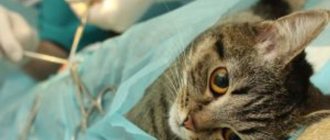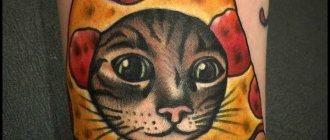Causes
If an animal licks itself or itches after sleep, this is quite normal. The cat is just tidying up. After the cat has eaten deliciously, she begins to actively lick herself. This is sometimes not liked by owners who feed their animals natural food. Because, having licked itself and combed itself, the animal actively smells of the food it just ate.
It is especially unpleasant if a curious animal looks into the trash can. Sometimes cats can pull out the remains of herring or other fish and eat them. And then lick yourself thoroughly. After this, the cat will actively smell of fish for some time.
If the cat itches constantly and licks itself until its hair falls out, you need to take your pet to the clinic to rule out serious diseases.
In addition, constant itching causes scratches on the body, which can become infected. In this case, the inflammatory process will not take long to occur, and its consequences can be very disastrous.
The itching may be skin-related or your cat may have itchy ears. In the latter case, the animal will scratch not only the auricle, but also try to put its paw into the ear canal and scratch the place that bothers it.
In addition to the fact that the animal is actively itching and gnawing at itself, as if trying to gnaw something out from under the skin, an attentive owner may notice:
- deterioration of the animal's fur and its loss;
- the pet's plaintive meowing when trying to scratch itself;
- red spots, rashes, excoriation (scratching) and ulcers on the skin;
- dandruff, scab, oily scales;
- excrement of parasites and the parasites themselves;
- constant licking of paws;
- scratching and biting one's own skin.
If the owner discovers something similar in his pet, he should take him to the veterinary clinic. As long as the changes are small, it is quite easy to help the animal. As the process progresses, it will take much more time and effort to heal your pet.
There are enough pathologies that cause increased itching.
The most common reason that an animal bites into its own rump is flea bites. In this case, you need to rid your pet of annoying insects as soon as possible.
Ear mite parasitism leads to severe itching in the auricle. The animal tries to bury its hind paw deeply and scratches the auricle. It rubs its head against pieces of furniture and shakes it, as if trying to shake something out of its ear. In addition, the owner may notice an unpleasant odor from the animal’s ear, discharge of a brown substrate, and hearing impairment. With otitis (inflammation of the ear in a cat), the symptoms will be approximately the same. When trying to scratch its ear, the cat may meow pitifully.
When a cat's skin is parasitized by a lice-eater mite, the animal's hair deteriorates and falls out. The skin is very itchy, the animal scratches the skin vigorously, and crusts appear on it. The waste products of parasitic insects are found in the wool.
Sarcoptic mange is a parasitic disease caused by mites that burrow into the deep layers of the skin. At the initial stage, sarcoptic mange is asymptomatic. Its main symptom is frequent scratching of the animal. Then redness appears on the skin. As the disease develops, quickly bursting blisters appear on the animal’s face and near the ears. The itching at this time is very strong, the animal actively itches, spreading parasites throughout the body. The skin in the affected area dries and becomes bald. Deep wounds appear on the animal's tail and paws, oozing ichor.
Notoedrosis, or cat scabies, is another tick-borne infection. It manifests itself as severe itching. The first signs of this disease are loss of hair around the cat's ears and very severe itching in this area. Soon the ticks “settle” in the animal’s abdomen, perhaps moving from the muzzle while the animal sleeps, curled up in a ball. The fur on the animal's belly falls out, the skin thickens, becomes covered with pustules and scabs. The cat constantly licks and scratches the affected areas. Demodectic mange and cheyletiellosis cause similar symptoms.
Pyoderma, fungal infections, and autoimmune diseases lead to the appearance of various rash elements on the animal’s skin (vesicles, pustules, scabs, ulcers, erosions) and severe itching.
Hormonal imbalances can lead to itching and the appearance of a brown scab on the animal's tail and croup area.
Intestinal diseases or helminth infections in severe cases also cause severe itching. But, in addition to the fact that the cat is itching, the owner may notice a deterioration in her mood, a decrease in appetite and stool disorders. And sometimes vomiting.
Cause itching and fungal diseases. An animal’s body is home to millions of microorganisms that do not manifest themselves in any way if the animal is in good health. But illness or a stressful situation for the body can cause a weakening of the immune system. Fungi become more active and the animal begins to itch. In this case, weeping wounds and non-healing scabs quickly form.
Allergies are one of the most common reasons that cause a cat to actively scratch, scratching the skin.
Sometimes the cat itches a lot, but he doesn’t have any fleas or infections, and he doesn’t suffer from allergies. In this case, the itching may be psychogenic. As a result of stress, a cat may lose its fur, combing it out in clumps.
How to stop a cat from chewing wires: 5 ways
Owners of mustachioed pets should not ignore their increased curiosity about cables from electrical appliances. If pieces of insulating material or the cord itself enter the pet’s body, it will lead to disruption of the gastrointestinal tract and digestive problems. There is also a risk of electric shock, which can be fatal.
The owner’s task is to protect the mustache from surrounding threats and keep the property intact. This can be done in different ways; which one is suitable is usually determined by experience.
Remove or disguise wires
The simplest and most affordable way to wean your fluffy from a bad habit is to disguise the cords from electrical appliances. After all, if he doesn’t see the cord, then he won’t have the desire to play with it.
In furniture and hardware stores you can purchase devices that make it possible to hide attractive wiring from the cat’s eyes. Here are the most accessible ones:
- Tubes
. They are convenient for hiding frequently used cables. The material of the devices is durable, and the tubes themselves are quite large. The prankster will not be able to damage them and their contents.
- Ties
. They will help increase the diameter of electrical cords. By pulling several wires at once, the owner will make the cat’s desire to bite them almost impossible to fulfill.
- Fasteners or staple gun
. Devices will be needed to firmly secure cables of electrical appliances to furniture or baseboards.
- Skirting boards
. You can put the desired toy in special compartments or place it under the baseboard. This method will not spoil the design of the room and will protect the mustache.
Rarely used devices and accessories should be placed in a place inaccessible to the animal. Lockable cabinets, high shelves, and drawers are good for these purposes. It is important not to leave your furry, especially a young one, alone with the cable without human supervision. This can lead to disastrous consequences.
Divert attention
An equally effective way to wean a household troublemaker from chewing everything is to switch attention to something else. For example, you can place different colored cocktail straws near electrical cords. The tubes will definitely interest the four-legged animal and distract it for some time.
It’s great if the owner devotes enough time to the naughty guy. Interested children and adults will pay less attention to dangerous objects, considering the owner the best option for joint entertainment.
In addition, you can buy special toys for your pet. Safe trinkets will delight the prankster and occupy all the time free from sleep, food and contemplation.
Develop a reflex
Some owners manage to form conditioned reflexes in the animal that cause a persistent hostility to the elements of electrical appliances. Experienced owners have many stories and tips on what to do if a cat chews wires. Here are a few of them:
- Make loud noises when the furry approaches an inappropriate thing. You can clap your hands, stomp your feet or whistle. The main thing is that the noise does not frighten, but distracts and simply warns against further action.
- Attach various rustling materials to electrical cables. For this purpose, you can use candy wrappers, pieces of foil, and gift wrapping. When approaching an electrical appliance, the animal will touch the rustling object, get scared and no longer show interest in it. The method is not suitable for lovers of paper and foil toys - they will only become more interested in electrical wiring.
- Attach double-sided tape. Animals hate sticky objects or surfaces. If you insulate the wire with double-sided tape, then the four-legged animal will definitely lose the desire to bite it.
But there are tips that should never be used. For example, you should not spray a prankster with water from a spray bottle. This is very dangerous for the life and health of your four-legged friend - drops of water can cause an electrical short circuit, thereby harming not only the device itself, but also the fluffy one.
Use repellent odors
There are scents that four-legged animals absolutely do not like. Some can even scare them away. Treating electrical cables helps solve the problem.
However, here they choose a golden mean: periodically refresh the aroma and do not choose too strong odors. If the amber is suffocating, then it will be difficult for the owner to stay in the room.
Special veterinary solutions and sprays are used as repulsive scents. The drug Antigryzin has proven itself well - you can buy the spray at any pet store or veterinary pharmacy.
Natural substances are also suitable for this purpose: four-legged animals do not like the aroma of essential oils of orange, tangerine, lemon or grapefruit. The smell repels if you rub fruit peels on items prohibited for pets.
Fresh citrus peels, which are laid out next to electrical cables, will have no less effect. The smell will repel the pet until the peel dries. The skins must be changed periodically for the effect of the method to be long-lasting.
In no case should you use medications or chemicals that lead to severe poisoning for the purpose of scaring away.
Review your diet
Absolutely all the happy owners of a furry prankster have wondered why a cat chews wires. Sometimes this happens due to a lack of important microelements and vitamins in the animal’s diet. Trying to make up for their deficiency, the pet switches to eating plants and chewing rubber and plastic objects.
You can wean your pet off the wrong habit by adjusting its diet. Pet pharmacies sell vitamins specifically designed for plastic- and rubber-chewing four-legged animals. Such preparations are available in the form of various hard blocks, sticks and pebbles.
Sometimes these are pills that the mustache will happily chew on. This way, he will not only get rid of a dangerous habit, but also cleanse his fangs of plaque, massage his gums and receive the vitamins and minerals necessary for the body.
Symptomatic treatment
Active scratching is always just a symptom signaling that the animal is experiencing discomfort. Effective treatment without identifying the root cause is impossible. Therefore, the animal will still have to be taken to the veterinarian. Based on the external examination and test results, the specialist will prescribe treatment.
So, in case of allergic reactions, an antihistamine will be prescribed. It is important to identify the allergen and eliminate it from the animal’s life.
For dermatitis, otitis, pyoderma, the doctor will prescribe antibiotics. In some cases, hormonal therapy is used (mainly treating scratches with hormonal ointments and creams).
For fungal diseases, antifungal agents are prescribed.
Acaricidal drugs effectively control ticks.
The most important thing for a quick recovery is to avoid scratching. To do this, you can use special mittens on the animal’s paws. You can buy them at pet stores. If your cat takes off her mittens, you need to trim her claws short.
To prevent bites, a special collar is used.
If the cause of itching is parasites, then not only the animal is treated with the drug, but also the places where it is located in the apartment: couches, rugs, rugs, beds.
It is important to carry out treatment comprehensively. The diet needs to be enriched with vitamins and microelements. For these purposes, special vitamin complexes or dietary supplements are suitable.
Why does a kitten or cat chew wires?
It’s interesting that most of the mustachioed friend’s pranks are not a desire to spoil the mood of his beloved owner. Basically, Skoda is a simple curiosity and desire to play.
Toy shortage
Curiosity is characteristic not only of children, but also of adult representatives of the cat family. Pranksters want to taste, touch surrounding objects, and play with them.
All they need is a candy wrapper they find, a piece of ribbon or a juice straw to have fun for a few hours. That's why mustaches are beginning to be interested in electrical cables that look like ribbons. Multi-colored cords become an alternative to toys or even a ball of thread.
Desire to sharpen teeth
Dental problems accompany furry pets throughout their lives. Interest in electrical cables in growing kittens can be explained by the replacement of milk canines with permanent ones. The natural process is accompanied by slight discomfort - the baby’s gums itch, so there is a natural desire to rub them.
Adults use electrical cables to clean plaque from their teeth. Here the problem arises due to the pet’s improper diet - if the cat eats mostly soft food, then plaque from the teeth is not cleaned naturally. The introduction of dry ingredients will help relieve your pet of discomfort and the desire to chew on everything.
To attract attention
Pets are very attached to their owner and his family members. Some individuals experience real stress during the absence of a loved one. Cats, like little children, want attention.
If a cat lacks communication, it begins to attract its owner in different ways. Sometimes the mustache throws objects from tables or flower pots from windows. The bitten cords from electrical appliances also become an attempt by the cat to attract the attention of the owner, expressing himself in a request to devote time to the furry minx.
Lack of vitamins
In their natural habitat, representatives of the cat family have always made up for the lack of elements important for life by eating different types of plants or gnawing on branches and bark. Pets do not always have the opportunity to walk in the fresh air. The only source of vitamins and minerals for them is food.
Pets try to make up for the lack of essential microelements in all possible ways. They chew on houseplants, wooden furniture legs, metal objects and electrical cords. The latter are impregnated with special compounds that emit a characteristic chemical odor. It is these aromas that attract some mustaches with vitamin deficiency.
Symptomatic diet and procedures
To ensure that itching bothers your cat as little as possible, prevention is important. Experts recommend adhering to the following simple rules:
- The animal needs to be provided with healthy, balanced food. For these purposes, it is better to use specialized food.
- The cat should not be fed smoked meats, sausages, or junk food from the table.
- Regularly brush your cat, remove hair mats, and inspect the surface of the animal’s skin.
- Once every six months, treat the fur against parasites (relevant for animals that at least occasionally go out for a walk).
- Do not allow your cat to come into contact with street animals.
- Avoid situations in which your cat can taste or smell household chemicals.
- In case of insect bites, promptly treat the bitten area.
- Once a week, inspect your cat’s ears for mites and inflammation.
If a cat scratches and chews itself, this is not always bad. The desire to scratch is natural for animals. You should pay attention to your pet when scratching begins to interfere with a full life. Timely treatment will help your cat recover faster and prevent unpleasant complications associated with endless itching.











